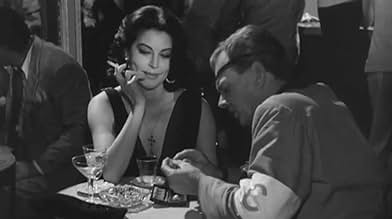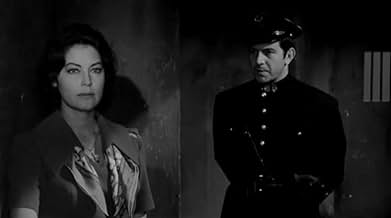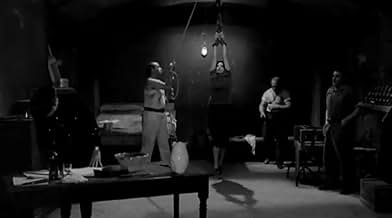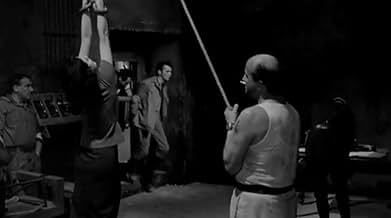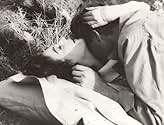Father Arturo Carrera leaves the priesthood over the church's indifferent position during the Spanish Civil War, but finds himself attracted to beautiful entertainer Soledad.Father Arturo Carrera leaves the priesthood over the church's indifferent position during the Spanish Civil War, but finds himself attracted to beautiful entertainer Soledad.Father Arturo Carrera leaves the priesthood over the church's indifferent position during the Spanish Civil War, but finds himself attracted to beautiful entertainer Soledad.
- Director
- Writers
- Stars
Robert Bright
- Father Idelfonso
- (uncredited)
Franco Castellani
- José
- (uncredited)
Nino Castelnuovo
- Capt. Trinidad
- (uncredited)
Robert Cunningham
- Mac
- (uncredited)
Gustavo De Nardo
- Maj. Garcia
- (uncredited)
Franco Fantasia
- Cabaret Customer
- (uncredited)
Armando Fracassi
- Nationalist Prisoner
- (uncredited)
- Director
- Writers
- All cast & crew
- Production, box office & more at IMDbPro
Featured reviews
The Angel Wore Red is one of the few films in the English speaking world that
deals with the Spanish Civil War. It takes an even handed approach to the
conflict as well.
The military high command in the Spanish Republic withdrew its support from the civil government that came into power after the Spanish monarchy was overthrown in 1931. The Nationalist had disciplined troops and the backing of the Catholic Church. The Republican government cobbled together an army and it fought as best it could from 1936 to 1939.
Dirk Bogarde decides to leave the church at the worst possible time when the city he was posted to is under siege. Those left wing folks occupying the city were very anti-Catholic and they were rounding up priests as spies for the Nationalists. When the Nationalists take the city he's got a problem with them in that they don't quite buy him either. The only one who seems to get him is Ava Gardner playing a bar entertainer who gets by the best she can. When you've been celibate you can imagine how intense it must have been.
There's also a religious relic that the church has, a drop of blood from St.John the Divine. Both sides want to possess it.
This tale is told from neutral correspondent Joseph Cotten who with his eye patch is modeled on Floyd Gibbons. He's quite cynical about the war and is not believing all the fuss about this religious relic. But the phenomenon is there for him to report.
According to Lee Server's biography of Ava Gardner, both she and Bogarde were most dissatisfied with how MGM distributed the film. Both felt they did good work and they did and wished more had seen the film.
It's something you should see if you can.
The military high command in the Spanish Republic withdrew its support from the civil government that came into power after the Spanish monarchy was overthrown in 1931. The Nationalist had disciplined troops and the backing of the Catholic Church. The Republican government cobbled together an army and it fought as best it could from 1936 to 1939.
Dirk Bogarde decides to leave the church at the worst possible time when the city he was posted to is under siege. Those left wing folks occupying the city were very anti-Catholic and they were rounding up priests as spies for the Nationalists. When the Nationalists take the city he's got a problem with them in that they don't quite buy him either. The only one who seems to get him is Ava Gardner playing a bar entertainer who gets by the best she can. When you've been celibate you can imagine how intense it must have been.
There's also a religious relic that the church has, a drop of blood from St.John the Divine. Both sides want to possess it.
This tale is told from neutral correspondent Joseph Cotten who with his eye patch is modeled on Floyd Gibbons. He's quite cynical about the war and is not believing all the fuss about this religious relic. But the phenomenon is there for him to report.
According to Lee Server's biography of Ava Gardner, both she and Bogarde were most dissatisfied with how MGM distributed the film. Both felt they did good work and they did and wished more had seen the film.
It's something you should see if you can.
Dirk Bogarde was an amazingly talented actor--so much so that I specifically look for his films. However, despite MANY great films, he occasionally made a stinker...and "The Angel Wore Red" is one of them. The movie lost money and I can see exactly why.
The story is set just before the first days of the Spanish Civil War in 1936. Arturo (Bogarde) is a priest serving in Spain and he's disenchanted with the Church. He is so disenchanted that he leaves the priesthood. However, his timing sucks...as the Civil War breaks out and priests are being rounded up and shot! The new Socialist/Communist backed Republicans blame the Church for supporting the Nationalists....and folks are taking retribution of the priests, as they are in a Republican stronghold. Now Arturo has to flee for his life...as folks THINK he's still a priest.
During his time on the run, Arturo is aided by a 'girl of easy virtue' (Ava Gardner) and, inexplicably, the pair fall in love. Now this really does NOT make any sense and it happens way too quickly to be believable. To make it worse, often the film lets the pair just talk and talk and talk....and it's all quite sticky and sappy.
Later, Arturo is caught by the Republicans. They would rather not kill him, since they learned he left the priesthood, but instead of releasing him they force him to work with him. His unenviable task is to take confessions from the priests they are about to execute!! What's next for him and his new main squeeze?
Despite the story seeming rather anti-clerical and having a love affair between an ex-priest and 'good time girl' may seem very anti-clerical, the film actually takes a rather neutral view overall. Unlike many movies of the 1940s that were decidedly pro-Republic, this one shows the Republic a little more realistically...and the film hedges its bets by having Arturo learn to once again love the Church. Considering the Republicans were backed by Stalin and the Nationalists backed by Hitler, it wasn't exactly a war where one side was 'the good guy' and the other 'evil'....and the movie at least gets this part of the story right. Unfortunately, the love affair is unconvincing and the dialog silly and trite. Too bad...as Bogarde was simply better than the material they gave him.
The story is set just before the first days of the Spanish Civil War in 1936. Arturo (Bogarde) is a priest serving in Spain and he's disenchanted with the Church. He is so disenchanted that he leaves the priesthood. However, his timing sucks...as the Civil War breaks out and priests are being rounded up and shot! The new Socialist/Communist backed Republicans blame the Church for supporting the Nationalists....and folks are taking retribution of the priests, as they are in a Republican stronghold. Now Arturo has to flee for his life...as folks THINK he's still a priest.
During his time on the run, Arturo is aided by a 'girl of easy virtue' (Ava Gardner) and, inexplicably, the pair fall in love. Now this really does NOT make any sense and it happens way too quickly to be believable. To make it worse, often the film lets the pair just talk and talk and talk....and it's all quite sticky and sappy.
Later, Arturo is caught by the Republicans. They would rather not kill him, since they learned he left the priesthood, but instead of releasing him they force him to work with him. His unenviable task is to take confessions from the priests they are about to execute!! What's next for him and his new main squeeze?
Despite the story seeming rather anti-clerical and having a love affair between an ex-priest and 'good time girl' may seem very anti-clerical, the film actually takes a rather neutral view overall. Unlike many movies of the 1940s that were decidedly pro-Republic, this one shows the Republic a little more realistically...and the film hedges its bets by having Arturo learn to once again love the Church. Considering the Republicans were backed by Stalin and the Nationalists backed by Hitler, it wasn't exactly a war where one side was 'the good guy' and the other 'evil'....and the movie at least gets this part of the story right. Unfortunately, the love affair is unconvincing and the dialog silly and trite. Too bad...as Bogarde was simply better than the material they gave him.
I thought this film was rather lacking in both narrative and film-making technique. The script is far from awful, but also far from interesting in the most part. As the previous reviewer says, the lighting, choice of shots etc. was jarring and obscured characters (Joseph Cotten, who indeed established no presence at all in this film partly due to this). The historical period examined is a curious if comendable choice, and while the general details are correctly conveyed, no attempt is really made to discuss the issues in much depth. Good to see neither of the two sides particularly favoured, although such a commitment might have added at least some drama. Drama is scant in the film, with a few scenes written as exposition, delivered in a way just as stilted.
The film actually has a rather good and eclectic cast for 1960, although the talents are ill used. Finlay Currie, Vittorio De Sica (well, seemingly in the main part a director), Dirk Bogarde (not yet of the stature achieved in films like "The Servant" and "Accident"), Joseph Cotten and Ava Gardner are all of some talent. De Sica's character who does indeed speak in a rather un-Italian, mid-Atlantic accent, which either suggests dubbing or a remarkably odd decision somewhere along the line - the character is portrayed as a Spanish patriot. The character's endless minor disparaging comments about modern warfare are mildly amusing in their frequency. I wouldn't say Ava Gardner is at all "past her prime" in this film, at about 37. Her performance is actually quite good, although lacking some credibility, and there are some pretty reasonable quiet scenes between her and Bogarde. Her beauty seems to have matured well, although the murky, technically below-par direction doesn't help this to show. Bogarde seemed quite good at times, but far from indelible or memorable in this role.
I would say this film is reasonably watchable and far from abject, but it is largely far from gripping or interesting.
Rating:- **/*****
The film actually has a rather good and eclectic cast for 1960, although the talents are ill used. Finlay Currie, Vittorio De Sica (well, seemingly in the main part a director), Dirk Bogarde (not yet of the stature achieved in films like "The Servant" and "Accident"), Joseph Cotten and Ava Gardner are all of some talent. De Sica's character who does indeed speak in a rather un-Italian, mid-Atlantic accent, which either suggests dubbing or a remarkably odd decision somewhere along the line - the character is portrayed as a Spanish patriot. The character's endless minor disparaging comments about modern warfare are mildly amusing in their frequency. I wouldn't say Ava Gardner is at all "past her prime" in this film, at about 37. Her performance is actually quite good, although lacking some credibility, and there are some pretty reasonable quiet scenes between her and Bogarde. Her beauty seems to have matured well, although the murky, technically below-par direction doesn't help this to show. Bogarde seemed quite good at times, but far from indelible or memorable in this role.
I would say this film is reasonably watchable and far from abject, but it is largely far from gripping or interesting.
Rating:- **/*****
Despite some obvious flaws I regard this film as a major achievement. The first obvious problem is the dubbing. Vittorio De Sica, a great actor is dubbed in English by a run of the mill voice over technician. The film suffers from being a joint Anglo/American- Italian production.
But it is one of the most mature treatments of a political historical theme that I have ever seen. Neither the loyalists nor the Franco led rebels are spared. Both are essentially brutal totalitarians. The Catholic Church is not spared either. Churchmen are showed to be so out of touch with their flock as to be almost comical, and yet when finally knocked off their pedestal they recover their Christianity. Dirk Bogard gives a subtle and brilliant performance as the tortured young priest. Ava Gardner is perfect as the cynical and yet innocent prostitute. It is actually to her advantage that she played this role at 37 rather than ten years earlier. She would simply been too overpoweringly beautiful to have been fully creditable in the part. Aldo Frabrizzi's part may be too reminiscent of his role in Open City especially at the end. Vittorio De Sica seems to have been doing an imitation of Claude Raines in Casablanca. It would have been good to have heard those two great actors in their native Italian. Joseph Cotton as the one eyed jaded reporter gives a broad yet compelling interpretation. The films failings pale in comparison to its overriding importance.
But it is one of the most mature treatments of a political historical theme that I have ever seen. Neither the loyalists nor the Franco led rebels are spared. Both are essentially brutal totalitarians. The Catholic Church is not spared either. Churchmen are showed to be so out of touch with their flock as to be almost comical, and yet when finally knocked off their pedestal they recover their Christianity. Dirk Bogard gives a subtle and brilliant performance as the tortured young priest. Ava Gardner is perfect as the cynical and yet innocent prostitute. It is actually to her advantage that she played this role at 37 rather than ten years earlier. She would simply been too overpoweringly beautiful to have been fully creditable in the part. Aldo Frabrizzi's part may be too reminiscent of his role in Open City especially at the end. Vittorio De Sica seems to have been doing an imitation of Claude Raines in Casablanca. It would have been good to have heard those two great actors in their native Italian. Joseph Cotton as the one eyed jaded reporter gives a broad yet compelling interpretation. The films failings pale in comparison to its overriding importance.
A fairly potent script with an interesting plot device at its core (both believers and non-believers alike chase after a sacred religious relic during a bloody civil war), undermined by rather bland, pedestrian film-making. Thus, it's not terribly surprising this was the last film directed by the prolific screenwriter Nunnally Johnson. He shoots just about everything in an overly dark and cramped way making it often impossible to determine where a scene is set, let alone what is going on or even who is in it. This may have been intentional, with the absence of light meant to convey the spiritual darkness in which the country of Spain was submerged at the time, but it comes off as crude and makes for rough viewing. There's something strange about the sound as well; there are few if any sufficiently lit close ups and it seems as if some of the actors' voices have been dubbed. Vittorio DeSica's character, for instance, comes across a bit like Truman Capote playing General Patton. Joseph Cotten pops up every now and again, as a cynical, gravel-voiced newsman, (in fact, he also narrates) but you never ever really see his face and there is something disembodied about his entire presence. It's all a bit unsettling.
Nonetheless, if you can endure its flaws, the movie raises some thought provoking questions on the nature of faith and religion in times of strife, and Dirk Bogarde is quite impassioned as the troubled priest. Ava Gardner, however, is noticeably past her prime as Bogarde's love interest, and her character isn't adequately fleshed out.
Nonetheless, if you can endure its flaws, the movie raises some thought provoking questions on the nature of faith and religion in times of strife, and Dirk Bogarde is quite impassioned as the troubled priest. Ava Gardner, however, is noticeably past her prime as Bogarde's love interest, and her character isn't adequately fleshed out.
Did you know
- TriviaThe film was originally planned to be shot on-location in Spain. However, due to the unflattering portrayal of Nationalists in the Spanish Civil War, the Franco regime declined permission.
- GoofsWhen the prisoners are being marched for several days to be presented to the fascists, the group contains a substantial number of women. At least two women are shown confessing to Arturo. But when the fascists capture the group, Arturo tells the commander that the group consists of 200 men who should not be killed, no mention of women. When Arturo enters the church to tell the prisoners they are to be executed, the group is all men. The women have vanished.
- ConnectionsFeatured in Best in Action: 1960 (2018)
- How long is The Angel Wore Red?Powered by Alexa
Details
Box office
- Budget
- $1,843,000 (estimated)
- Runtime1 hour 35 minutes
- Color
- Aspect ratio
- 1.85 : 1
Contribute to this page
Suggest an edit or add missing content



